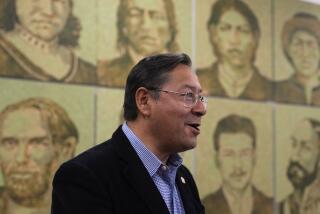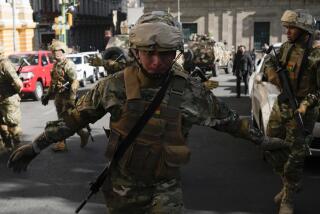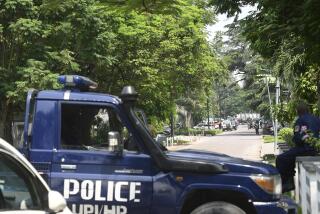Ex-Fiji Leader Backs Coup; Ousted Premier Asks Calm
- Share via
SUVA, Fiji — Former Prime Minister Ratu Kamisese Mara gave his backing today to the bloodless military coup in which soldiers abducted the newly elected prime minister and his Cabinet.
But Fiji’s governor general, an influential chief who represents Queen Elizabeth II in this former British colony, said he has assumed executive power and declared a “public emergency” because of the military takeover.
Prime Minister Timoci Bavadra, who defeated Mara in last month’s election and was abducted by soldiers Thursday along with his Cabinet, appealed for calm and said neither he nor his ministers have been harmed, the Fiji Times reported today.
Mara, in an interview, said he has accepted an offer from Lt. Col. Sitiveni Rabuka--who led the coup--to be the country’s new foreign minister.
Asked why he agreed, Mara said: “Well, my country seems to be . . . er, it needs help.”
Mara, whose electoral defeat on April 11 brought to power Fiji’s first government with an ethnic Indian majority, said he knew a coup would be launched an hour in advance but that when he heard the news, “I was dazed.”
The Fiji Times said Bavadra and his ministers were being held at the prime minister’s official residence after the first coup in the South Pacific. The comments it quoted were Bavadra’s first since Rabuka and about 10 soldiers raided Parliament, seizing him and the 11 members of his Cabinet.
The Fiji Times said Bavadra expressed hope that “this impasse” could be resolved soon, without suggesting how.
Rabuka, a decorated veteran of peacekeeping duties in the Middle East, has said Bavadra and his Cabinet will be set free but kept under house arrest until new elections. More than half the Fijian army serves with peacekeeping units in southern Lebanon and Egypt’s Sinai Peninsula.
Mara, a 66-year-old hereditary high chief who is staunchly pro-Western, had led every government since independence from Britain in 1970.
Bavadra’s government was the first to give a predominant role to ethnic Indians, who outnumber ethnic Fijians 49% to 47% in the 300-island archipelago.
Fiji, a popular tourist area, has a population of 715,000. Indians, many of whom are descended from indentured laborers brought in to work on British-run sugar plantations in the 19th Century, now dominate the islands’ commerce.
Ethnic Fijians traditionally have controlled the government and army.
Rabuka, who is 38 and third in command of the 2,000-man army, said he was taking over to stop incidents of racial violence that began after the election last month, the fifth since independence.
He claimed to have the army’s support. Some reports said his men arrested Col. Jim Sanday, ranked second in the military. The army commander, Brig. Ratu Epeli Nailatikau, was visiting Australia.
Several hours after the coup, Governor General Ratu Penaia Ganilau declared a “public emergency” and said he was assuming executive power under the constitution, which was written by the British.
Ganilau, whose office normally has little power, declared in a radio broadcast that he was taking immediate steps to “restore the lawful situation.” As governor general, he is the representative of Britain’s Queen Elizabeth II, who is Fiji’s formal head of state. Fiji is a member of the Commonwealth.
More to Read
Sign up for Essential California
The most important California stories and recommendations in your inbox every morning.
You may occasionally receive promotional content from the Los Angeles Times.










